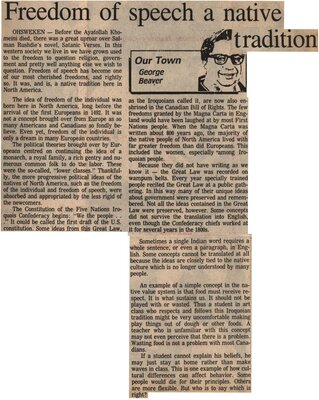"Freedom of Speech a Native Tradition"
- Full Text
- Freedom of speech a native tradition
OHSWEKEN - Before the Ayatollah Khomeini died, there was a great uproar over Salman Rushdie's novel, Satanic Verses. In this western society we live in we have grown used to the freedom to question religion, government and pretty well anything else we wish to question. Freedom of speech has become one of our most cherished freedoms, and rightly so. It was, and is, a native tradition here in North America.
The idea of freedom of the individual was born here in North America, long before the arrival of the first Europeans in 1492. It was not a concept brought over from Europe as so many Americans and Canadians so fondly believe. Even yet, freedom of the individual is only a dream in many European countries.
The political theories brought over by Europeans centred on continuing the idea of a monarch, a royal family, a rich gentry and numerous common folk to do the labor. These were the so-called, "lower classes." Thankfully, the more progressive political ideas of the natives of North America, such as the freedom of the individual and freedom of speech, were absorbed and appropriated by the less rigid of the newcomers.
The Constitution of the Five Nations Iroquois Confederacy begins: "We the people..." It could be called the first draft of the U.S. constitution. Some ideas from this Great Law, as the Iroquoians called it, are now also enshrined in the Canadian Bill of Rights. The few freedoms granted by the Magna Carta in England would have been laughed at by most First Nations people. When the Magna Carta was written about 800 years ago, the majority of the native people of North America lived with far greater freedom than did Europeans. This included the woman, especially among Iroquoian people.
Because they did not have writing as we know it - the Great Law was recorded on wampum belts. Every year specially trained people recited the Great Law at a public gathering. In this way many of their unique ideas about government were preserved and remembered. Not all the ideas contained in the Great Law were preserved, however. Some concepts did not survive the translation into English, even though the Confederacy chiefs worked at it for several years in the 1800s.
Sometimes a single Indian word requires a whole sentence, or even a paragraph, in English. Some concepts cannot be translated at all because the ideas are closely tied to the native culture which is no longer understood by many people.
An example of a simple concept in the native value system is that food must receive respect. It is what sustains us. It should not be played with or wasted. Thus a student in art class who respects and follows this Iroquoian tradition might be very uncomfortable making play things out of dough or other foods. A teacher who is unfamiliar with this concept may not even perceive that there is a problem. Wasting food is not a problem with most Canadians.
If a student cannot explain his beliefs, he may just stay at home rather than make waves in class. This is one example of how cultural differences can affect behavior. Some people would die for their principles. Others are more flexible. But who is to say which is right?
- Mystery Question
- When was this article published?[Please answer by clicking on the Comments tab]
- Creator
- Beaver, George, Author
- Media Type
- Newspaper
- Item Types
- Articles
- Clippings
- Description
- "Before the Ayatollah Khomeini died, there was a great uproar over Salman Rushdie's novel, Satanic Verses. In this western society we live in we have grown used to the freedom to question religion, government and pretty well anything else we wish to question. Freedom of speech has become one of our most cherished freedoms, and rightly so. It was, and is, a native tradition here in North America."
- Subject(s)
- Local identifier
- SNPL002660v00d
- Collection
- Scrapbook #1 by Janet Heaslip
- Language of Item
- English
- Geographic Coverage
-
-
Ontario, Canada
Latitude: 43.06681 Longitude: -80.11635
-
- Creative Commons licence
 [more details]
[more details]- Copyright Statement
- Public domain: Copyright has expired according to Canadian law. No restrictions on use.
- Copyright Holder
- Brantford Expositor
- Contact
- Six Nations Public LibraryEmail:info@snpl.ca
URL
Mail1679 Chiefswood Rd
PO Box 149
Ohsweken, ON N0A 1M0
519-445-2954


